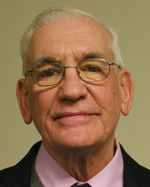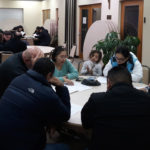By Glenn Leach
Despite my lack of theological credentials, I must object to the present dialogue I am reading and hearing about in which it seems no longer appropriate to offer ideas for discussion about the Catholic Church.

Some of that dialogue appears to be suggesting that there is an attack on church teaching and tradition. Scripturally, the whole of the Bible is the evolving story of God’s continuing revelation of himself to humankind, and humankind’s continuing struggle to comprehend and respond to that revelation.
Although church teaching changed or evolved in the past, it seems that some have now pronounced that evolution as done. The present attitude veers toward the assumption that God no longer speaks. The working of the Holy Spirit is now limited to liturgical reference, not as being active in the hearts and minds of the faithful. It seems we have replaced God with books of rules, which, once set down, are immutable.
Professor Keith Soko, in a recent opinion piece in The Quad-City Times, offered some ideas about possible restructure of the church and addressed specific areas needing priority attention. These were not offered as either causes of the sexual abuse scandal, nor necessarily that which will be guaranteed to prevent it. Sexual abuse is not caused by celibacy or male domination in the church. It is a personality disorder which results in an individual exercising his power over others in a sexual manner.
The changes which Soko, a theologian, presented were changes to the church environment which allows that disorder to be expressed unchecked. Essentially, he calls for changes to the existing power structure of the church and some of the consequences of that power structure. He also suggested that some church teachings be re-examined in light of scientific advances in understanding, as when the church changed its teaching about the sun revolving around the earth and when it recognized its failure to early on denounce slavery as an affront to life and dignity of all human persons.
Regarding the notion that Soko was simply elevating popular secular sentiments, consideration needs to be given to the work of the Holy Spirit and the sensus fidelium. Vatican II’s Dogmatic Constitution on the Church (Lumen Gentium) stated: “The entire body of the faithful, anointed as they are by the Holy One, cannot err in matters of belief.”
Failure to give serious consideration to what people of faith are struggling with in their lives is, in my opinion, a suppression of the sensus fidelium. As far back as 1859, Blessed John Henry Newman wrote that the ordained and even the laity too often neglected to consult the faithful on matters of doctrine. Failure to give serious consideration to the struggles of the faithful is to place them on the margins, something about which the Holy Father has had considerable to say.
Soko is a theologian, a person who studies Scripture to see what it reveals, in particular, revelation to humankind. If we consider that all has been revealed, that God no longer speaks, that the Holy Spirit is confined to acting within the texts we already have created, then we have no need of theologians and we can study the Bible simply as literature.
If we are unwilling or unable to seriously address the questions or suggestions that theologians propose and what the faithful are struggling with, then we are part of the problem, not the solution.
(Glenn Leach is a member of St. Ann Parish, Long Grove.)











